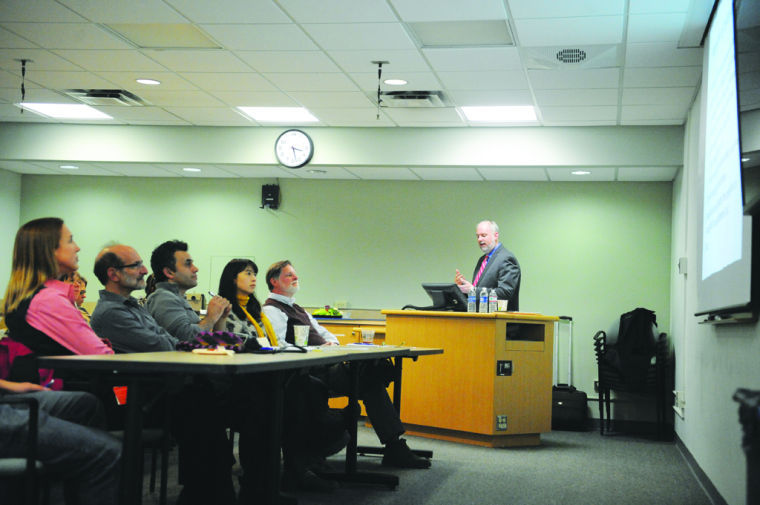Professor links peer pressure to health choices
February 12, 2014
David Shoham believes that peer pressure can be a good influence when it comes to promoting a healthy lifestyle.
Shoham, an assistant professor at Loyola University Chicago’s Department of Public Health Sciences, researches the connection between social networking and its effect on levels of obesity, to prove whether close friends have a large impact on a person’s health choices.
Shoham shared some of his findings to 25 Pitt faculty members and students in his lecture, Social Networking to Combat Obesity: Worth the Effort?, that was held in Perron Hall at 3 p.m. Tuesday.
“I try to prove whether thin people tend to be friends with thin people, and larger people befriend other larger people, and whether this influences overall life choices,” Shoham said.
Shahom began studying cardiovascular disease at the University of North Carolina, which led him to study obesity. He researched whether people, especially young people, befriend each other based on weight and whether these friendships influence overall life choices.
“If someone tries to lose weight, their overweight friends may think it’s weird and pull them back,” Shoham said.
Shoham spoke about how people who have a larger social networking system — for example, those with a larger group of friends — have a greater influence on those around them.
One type of experiment Shoham uses in his research to determine the size of a person’s social network is to ask high school students to name their top five closest friends. If the five friends named do not reciprocate a particular student’s friendship when asked the same question, the initial student is considered to have a small social network.
According to Shoham, if people with a large social network are healthy and educated about the effects of obesity, the idea will spread and stimulate others to do the same. This will eventually lead to a lower overall body mass index.
Shoham said he could use ideas of social learning theory, a cognitive learning process that takes place in a social context, and peer pressure to create healthy lifestyles for people.
“People tend to conform to the ideas of those that they respect, and if we take advantage of that, we can cause change,” he said.
Pitt’s Public Health Dynamics Laboratory, which leads the development of computational modeling and simulation in Pitt’s Graduate School of Public Health, sponsored the lecture. The laboratory also aims to create open-source software that allows access to data and simulated populations.
Hasan Guclu, an assistant professor at Pitt’s Department of Biostatistics and Public Health Dynamics Laboratory, works with the network analysis of the program. To figure out the effects of social networking in an efficient manner, Guclu developed a virtual environment that simulates real life.
“We use it to study how peer pressure and social networking can influence lifestyles, especially when it comes to obesity,” Guclu says.
Guclu compared Shoham’s work to an advertisement or a campaign because it starts with a small group in a community, but can “trigger an effect on a whole society.”
Christina Mair, an assistant professor at Pitt’s Graduate School of Public Health, thought Shoham’s frequent use of graphs and factual data made the lecture more relevant than she expected. She said the study had a lot of potential for the future.
“It was interesting that he included a lot of coverage in the media and community reactions to different findings that are involved with his program,” Mair said after the lecture. “There is also direct relevance since [Shoham] gives models that can be used in different instances.”
Shoham said he plans to expand his research to achieve further results.
“One of the next steps I want to take is to free it up a bit and add other influences like food environment and families, in addition to just social networking,” Shoham said. “We hope to make interventions and treat the increase [of obesity].”
Editor’s Note: An earlier version of this article stated that David Shoham is an assistant professor in Pitt’s Department of Preventative Medicine and Epidemiology and that he studied cardiovascular disease at the University of Loyola Chicago. These facts were incorrect and the article has been updated to reflect this.



